听力训练、给文章加题目
听力理解练习题短文理解

听力理解练习题短文理解短文一:购物咨询A: Good afternoon, welcome to our store. How can I assist you today?B: Hi, I'm looking for a dress for a special occasion. Can you help me find one?A: Of course! What kind of style are you looking for? Do you have any specific preferences?B: I prefer something elegant and formal, maybe in a dark color like black or navy blue.A: Great! We have a wide selection of elegant dresses in various colors. Let me show you some options.B: Thank you, I appreciate it. Could you also let me know about the prices?A: Sure, our prices range from $50 to $200, depending on the brand and material. Is there a specific budget you have in mind?B: I'm willing to spend around $100 for a good quality dress.A: Noted. I will keep that in mind while showing you the available options. Please follow me to the dress section.短文二:新闻播报News Anchor: Good evening, I'm your host, and these are the latest headlines.In local news, a new park is set to open in the city center next month. The park will feature a playground, jogging trails, and picnic areas for families to enjoy.In national news, a political scandal has erupted as several high-ranking officials were found to be involved in corrupt practices. The government has vowed to take strict action against those responsible.In international news, tensions have escalated between two neighboring countries due to a territorial dispute. Diplomatic negotiations are underway to resolve the issue peacefully.In entertainment news, the highly anticipated movie "The Enigma" is set to release next week. Critics are already praising the film for its captivating storyline and brilliant performances by the cast.And in sports news, our local soccer team secured their spot in the playoffs with a dramatic victory over their rivals. Fans are eagerly awaiting the upcoming matches.That's all for today's news. Thank you for tuning in, and we'll be back tomorrow with more updates.短文三:科技产品介绍Speaker 1: Ladies and gentlemen, thank you for joining us today. I'm excited to introduce our latest innovation in the world of technology - the SmartHome System. This system is designed to connect and control various devices in your home, adding convenience and efficiency to your daily life.Speaker 2: With our SmartHome System, you can remotely control your lights, thermostat, security cameras, and even your kitchen appliances through a mobile application. Imagine being able to turn off the lights or adjust the temperature from the comfort of your bed!Speaker 1: That's right. Our system utilizes cutting-edge technology to create a seamless experience. You can set schedules for different devices, allowing them to automatically adjust based on your preferences. For example, you can have the lights turn on and off at specific times or have your coffee maker start brewing just before you wake up.Speaker 2: Additionally, the SmartHome System is compatible with voice assistants such as Alexa or Google Home. You can simply give voice commands to control your home devices, making the whole process even more convenient.Speaker 1: Not only does the SmartHome System offer convenience, but it also enhances home security. You can receive real-time alerts on your smartphone if any suspicious activities are detected by the security cameras or sensors.Speaker 2: This system is designed to adapt to your lifestyle and provide you with a smarter, more connected home. Whether you're at work, on vacation, or just relaxing at home, the SmartHome System ensures that your home is efficiently managed and secure.Speaker 1: So, if you're ready to embrace the future of home automation, visit our website or contact our customer service team today. Experience the power of the SmartHome System and make your life easier and smarter. Thank you for your attention.。
小学四年级语文听力材料(附听力训练题)
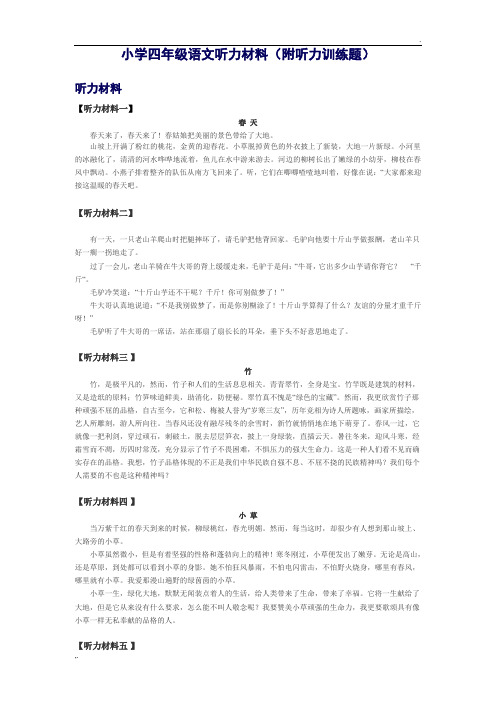
小学四年级语文听力材料(附听力训练题)听力材料【听力材料一】春天春天来了,春天来了!春姑娘把美丽的景色带给了大地。
山坡上开满了粉红的桃花,金黄的迎春花。
小草脱掉黄色的外衣披上了新装,大地一片新绿。
小河里的冰融化了,清清的河水哗哗地流着,鱼儿在水中游来游去。
河边的柳树长出了嫩绿的小幼芽,柳枝在春风中飘动。
小燕子排着整齐的队伍从南方飞回来了。
听,它们在唧唧喳喳地叫着,好像在说:“大家都来迎接这温暖的春天吧。
【听力材料二】有一天,一只老山羊爬山时把腿摔坏了,请毛驴把他背回家。
毛驴向他要十斤山芋做报酬,老山羊只好一瘸一拐地走了。
过了一会儿,老山羊骑在牛大哥的背上缓缓走来,毛驴于是问:“牛哥,它出多少山芋请你背它?“千斤“。
毛驴冷笑道:“十斤山芋还不干呢?千斤!你可别做梦了!”牛大哥认真地说道:“不是我别做梦了,而是你别糊涂了!十斤山芋算得了什么?友谊的分量才重千斤呀!”毛驴听了牛大哥的一席话,站在那扇了扇长长的耳朵,垂下头不好意思地走了。
【听力材料三】竹竹,是极平凡的,然而,竹子和人们的生活息息相关。
青青翠竹,全身是宝。
竹竿既是建筑的材料,又是造纸的原料;竹笋味道鲜美,助消化,防便秘。
翠竹真不愧是“绿色的宝藏”。
然而,我更欣赏竹子那种顽强不屈的品格,自古至今,它和松、梅被人誉为“岁寒三友”,历年竞相为诗人所题咏,画家所描绘,艺人所雕刻,游人所向往。
当春风还没有融尽残冬的余雪时,新竹就悄悄地在地下萌芽了。
春风一过,它就像一把利剑,穿过顽石,刺破土,脱去层层笋衣,披上一身绿装,直插云天。
暑往冬来,迎风斗寒,经霜雪而不凋,历四时常茂,充分显示了竹子不畏困难,不惧压力的强大生命力。
这是一种人们看不见而确实存在的品格。
我想,竹子品格体现的不正是我们中华民族自强不息、不屈不挠的民族精神吗?我们每个人需要的不也是这种精神吗?【听力材料四】小草当万紫千红的春天到来的时候,柳绿桃红,春光明媚。
然而,每当这时,却很少有人想到那山坡上、大路旁的小草。
六年级语文听力题训练

六年级语文听力题训练完成听力题的要求:1、教师读题一遍。
2、学生认真听,根据材料回答。
(一)【材料】几年前,一位刚毕业的女孩打电话给父母,说她要去一家外企应聘,无意中提起中途会经过父母所在城市的一个小站。
那个小站在邻县,距离他父母所在的城市有两个小时车程。
列车停靠在那个小站时是六点十分,停靠时间约十分钟,车刚停稳,女孩倚在窗口,隐约听见有人呼唤她的名字,她探身窗外——在蒙蒙曙色中是母亲的身影。
母亲急急忙忙把用毛巾包着的一个瓷缸递给她,揭开盖子,是热气腾腾的肉汤。
短暂的十几分钟,母亲几乎不容她说什么,只是满足的幸福的催她一口一口的喝汤。
天凉,汤冷得快。
列车开动时,女孩的母亲捧着一个空瓷缸站在月台上向女孩挥手。
(节选自《时文精选》苇文)(一)【题目】1、列车停靠在校站的时间是,你估计母亲从家里出发的时间最迟是。
2、喝了热腾腾的汤后,女孩会对母亲说。
3、短文表达了的情感。
你能想起母亲为你做的最让你感动的事是(二)【材料】村口就是大河,水给村里的孩子带来欢乐,但有时也带来悲伤——难免有孩子被大河吞噬了生命。
村口一家有一个儿子。
长到五六岁,父母就这么一个宝贝疙瘩,怕孩子万一被水冲走,此恨何时了。
儿子听着别的孩子呼朋引伴去戏水,有时也情不自禁地移动脚步,然而……儿子10岁那年,滔滔的洪水漫过了村子,别的孩子像一条条鱼儿游离了险境。
他们的孩子却被洪水吞没。
悲伤的父母只知道溺爱孩子,但他们最终没有明白:对于河边的孩子,爱他们就该让他们学会游泳。
(改编自《智慧背囊》)(二)【题目】1、短文讲了村子里有一家人不让宝贝孩子怕他,村里的孩子却当洪水来时,村里的孩子,而这个小孩却。
2、根据内容,联系上下文,补充“然而”后面的内容3、故事告诉我们一个道理(三)【材料】在巴黎市中心的一个地铁站中,我看到一个年轻人,举着一个没有底的画框,让他那张干枯的脸处在画框中央,他把这叫做“自画像”。
他不会唱歌,不会弹吉他,不会吹萨克斯,不会跳舞,不会玩杂耍,不会施催眠术,但是他不肯白白伸手要钱,于是他发挥想象力,期待着有人观赏,有人被打动,朝他那木碗中投下一两枚硬币。
simon范文(15篇)
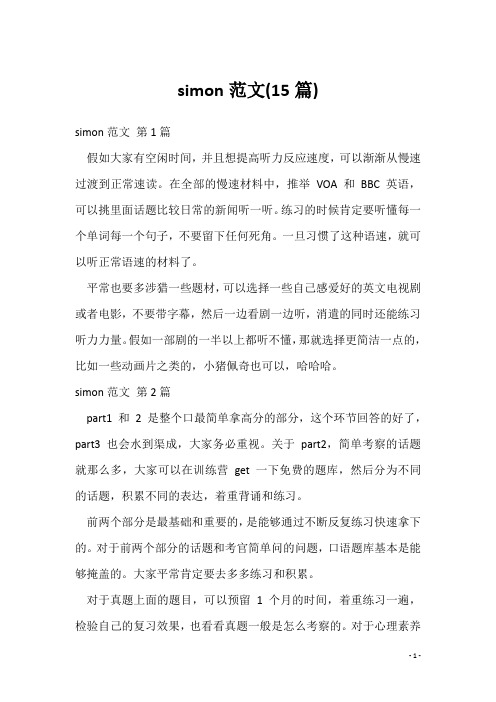
simon范文(15篇)simon范文第1篇假如大家有空闲时间,并且想提高听力反应速度,可以渐渐从慢速过渡到正常速读。
在全部的慢速材料中,推举VOA 和BBC 英语,可以挑里面话题比较日常的新闻听一听。
练习的时候肯定要听懂每一个单词每一个句子,不要留下任何死角。
一旦习惯了这种语速,就可以听正常语速的材料了。
平常也要多涉猎一些题材,可以选择一些自己感爱好的英文电视剧或者电影,不要带字幕,然后一边看剧一边听,消遣的同时还能练习听力力量。
假如一部剧的一半以上都听不懂,那就选择更简洁一点的,比如一些动画片之类的,小猪佩奇也可以,哈哈哈。
simon范文第2篇part1 和2 是整个口最简单拿高分的部分,这个环节回答的好了,part3 也会水到渠成,大家务必重视。
关于part2,简单考察的话题就那么多,大家可以在训练营get 一下免费的题库,然后分为不同的话题,积累不同的表达,着重背诵和练习。
前两个部分是最基础和重要的,是能够通过不断反复练习快速拿下的。
对于前两个部分的话题和考官简单问的问题,口语题库基本是能够掩盖的。
大家平常肯定要去多多练习和积累。
对于真题上面的题目,可以预留1 个月的时间,着重练习一遍,检验自己的复习效果,也看看真题一般是怎么考察的。
对于心理素养和口语基础不好的同学,肯定要反复练习,只有娴熟到肯定程度,才不会在考试的时候由于紧急、可怕等各种缘由出错。
simon范文第3篇雅思阅读对阅读速度要求是很高的,一共三篇学术文章,有40 个题目,答题时间仅仅只有 1 个小时左右,想都读完读懂做题是完全不行能的事情。
假如每一句、每一段都细读的话,可能一半的题目都做不完。
因此,肯定要学会利用关键词句快速定位到答案,这就是为什么许多时候看不懂文章,题目正确率却很高的缘由。
有了肯定的长难句和语法基础后,平常肯定要养成快速阅读的习惯,抓住一个句子的主干,把一些修饰性的内容跳过或者略读,丢掉逐个单词阅读的坏习惯,而是要一行一行地快速阅读,查找关键词和关键句。
听力短文题

听力短文题听力短文题是一种常见的语言测试题型,通常用于考察学生对听力材料的理解能力。
在听力短文题中,学生需要听取一段短文或对话,然后回答与该短文或对话相关的问题。
以下是一个听力短文题的示例:短文:The other day, I was walking down the street when I saw a man holding a sign that said "Free Hugs". I decided to approach him and ask what the deal was. He said that he was offering free hugs to random people as a way to brighten their day. I was skeptical at first, but he seemed so genuine that I decided to give him a try. As I wrapped my arms around him, I felt a sense of warmth and happiness spread through my body. It was such a simple gesture, but it made my day.问题:1. What did the man holding the sign say?A. Free hugsB. $5 offC. No parking hereD. No littering allowed2. Why did the author approach the man?A. To ask for directionsB. To borrow moneyC. To get a free hugD. To buy a newspaper3. How did the author feel after receiving the free hug?A. SkepticalB. WorriedC. HappyD. Nervous。
20116四级听力试题及答案解析

2011-6-四级听力试题及答案解析Part III Listening ComprehensionSection A11.M: Shawn's been trying for months to find a job. But I wonder how he could get a job when he looks like that.W: Oh, that poor guy! He really should shave himself every other day at least and put on something clean.Q: What do we learn about Shawn?答案:A. He is careless about his appearance.解析:男生首先对肖恩能否找到工作表示怀疑,因为他邋遢。
女生接着提到肖恩不修边幅,又说他应该每隔一天刮一次胡子,把自己弄得整洁干净一点。
由此可知,肖恩是一个对仪容仪表不太注重,比较粗线条的人shave,刮胡子;be careless about不在乎,不介意;12.W: I wish Jane would call when she know she'll be late. This is not the first time we've had to wait for her.M: I agree. But she does have to drive through very heavy traffic to get here.Q: What does the man imply?答案:A. Jane maybe caught in a traffic jam.解析:本题是推理题,在做题时要注意仔细推敲。
女生说:“Jane已经不是第一次迟到让我们等了,我希望她能事先打电话告诉我们一下”,可见女生对Jane迟到的作法是不满的。
精选三年级语文听力训练题 资料
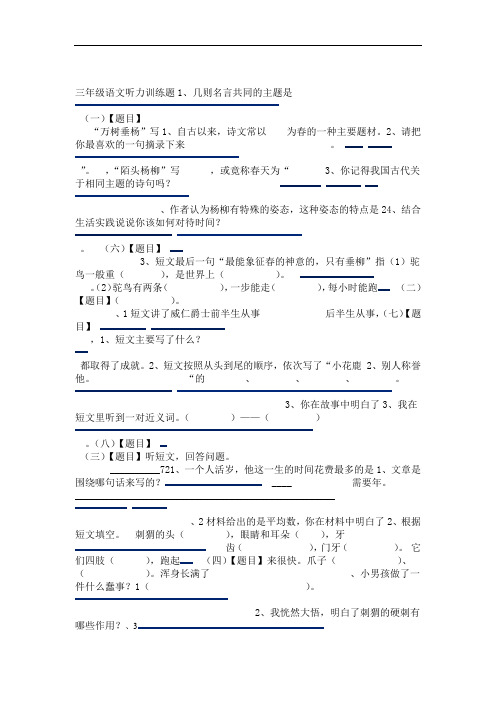
三年级语文听力训练题1、几则名言共同的主题是(一)【题目】“万树垂杨”写1、自古以来,诗文常以为春的一种主要题材。
2、请把你最喜欢的一句摘录下来。
”。
,“陌头杨柳”写,或竟称春天为“ 3、你记得我国古代关于相同主题的诗句吗?、作者认为杨柳有特殊的姿态,这种姿态的特点是24、结合生活实践说说你该如何对待时间?。
(六)【题目】3、短文最后一句“最能象征春的神意的,只有垂柳”指(1)驼鸟一般重(),是世界上()。
(2)驼鸟有两条(),一步能走(),每小时能跑(二)【题目】()。
、1短文讲了威仁爵士前半生从事后半生从事,(七)【题目】,1、短文主要写了什么?都取得了成就。
2、短文按照从头到尾的顺序,依次写了“小花鹿 2、别人称誉他。
“的、、、。
3、你在故事中明白了3、我在短文里听到一对近义词。
()——()。
(八)【题目】(三)【题目】听短文,回答问题。
__________721、一个人活岁,他这一生的时间花费最多的是1、文章是围绕哪句话来写的? ____ 需要年。
____________________________________________________、2材料给出的是平均数,你在材料中明白了2、根据短文填空。
刺猬的头(),眼睛和耳朵(),牙齿(),门牙()。
它们四肢(),跑起(四)【题目】来很快。
爪子()、()。
浑身长满了、小男孩做了一件什么蠢事?1()。
2、我恍然大悟,明白了刺猬的硬刺有哪些作用?、33、故事能给你在学习生活中的启示是__________________________________________________(五)【题目】【题目】(九).1)其中一个孩子交上他的画时,老师发现,他画的是儿很好,因为小乌鸦_______________,但是老乌鸦没有开口。
,看上去有点粗_____________________________________2、老喜鹊让小喜鹊抓一只蚱蜢给她吃,小喜鹊___________ 。
拔高听力水平小学听力练习题大集合
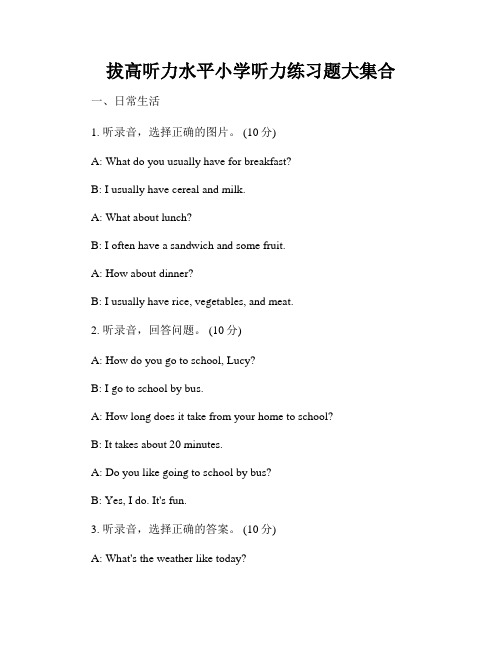
拔高听力水平小学听力练习题大集合一、日常生活1. 听录音,选择正确的图片。
(10分)A: What do you usually have for breakfast?B: I usually have cereal and milk.A: What about lunch?B: I often have a sandwich and some fruit.A: How about dinner?B: I usually have rice, vegetables, and meat.2. 听录音,回答问题。
(10分)A: How do you go to school, Lucy?B: I go to school by bus.A: How long does it take from your home to school?B: It takes about 20 minutes.A: Do you like going to school by bus?B: Yes, I do. It's fun.3. 听录音,选择正确的答案。
(10分)A: What's the weather like today?B: It's sunny and hot.A: What should we wear today?B: We should wear shorts and T-shirts.A: Should we bring an umbrella?B: No, we don't need an umbrella.4. 听录音,填入所缺的单词。
(10分) A: How many _______ are there in a year? B: There are twelve months in a year.A: How many _______ are there in a week? B: There are seven days in a week.二、学校生活1. 听录音,选择正确的答案。
TPO-40托福听力题目文本——对话部分(Conversation)【附答案】
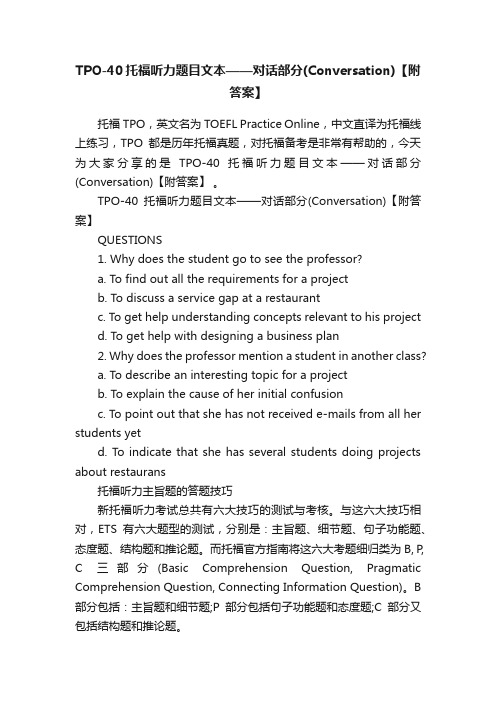
TPO-40托福听力题目文本——对话部分(Conversation)【附答案】托福TPO,英文名为TOEFL Practice Online,中文直译为托福线上练习,TPO都是历年托福真题,对托福备考是非常有帮助的,今天为大家分享的是TPO-40托福听力题目文本——对话部分(Conversation)【附答案】。
TPO-40托福听力题目文本——对话部分(Conversation)【附答案】QUESTIONS1. Why does the student go to see the professor?a. To find out all the requirements for a projectb. To discuss a service gap at a restaurantc. To get help understanding concepts relevant to his projectd. To get help with designing a business plan2. Why does the professor mention a student in another class?a. To describe an interesting topic for a projectb. To explain the cause of her initial confusionc. To point out that she has not received e-mails from all her students yetd. To indicate that she has several students doing projects about restaurans托福听力主旨题的答题技巧新托福听力考试总共有六大技巧的测试与考核。
与这六大技巧相对,ETS有六大题型的测试,分别是:主旨题、细节题、句子功能题、态度题、结构题和推论题。
初三英语考试听力练习题及答案
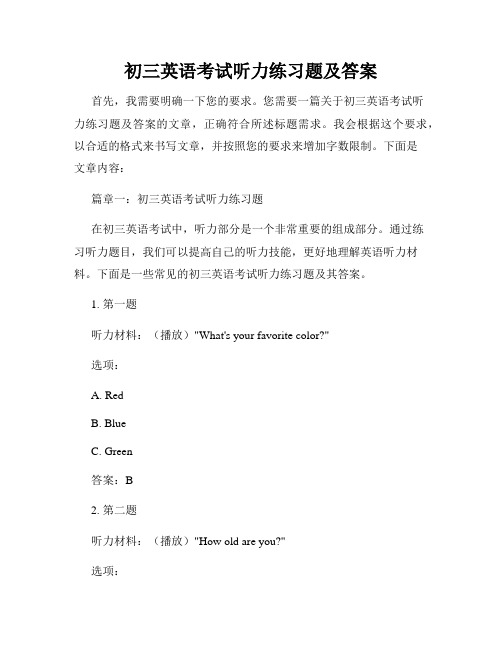
初三英语考试听力练习题及答案首先,我需要明确一下您的要求。
您需要一篇关于初三英语考试听力练习题及答案的文章,正确符合所述标题需求。
我会根据这个要求,以合适的格式来书写文章,并按照您的要求来增加字数限制。
下面是文章内容:篇章一:初三英语考试听力练习题在初三英语考试中,听力部分是一个非常重要的组成部分。
通过练习听力题目,我们可以提高自己的听力技能,更好地理解英语听力材料。
下面是一些常见的初三英语考试听力练习题及其答案。
1. 第一题听力材料:(播放)"What's your favorite color?"选项:A. RedB. BlueC. Green答案:B2. 第二题听力材料:(播放)"How old are you?"选项:A. Ten years oldB. Thirteen years oldC. Fifteen years old答案:C3. 第三题听力材料:(播放)"Where do you live?"选项:A. BeijingB. ShanghaiC. Guangzhou答案:A篇章二:初三英语考试听力练习题答案解析在这一部分,我们将对每个听力练习题的答案进行解析,并提供一些答案选项的相关知识点。
1. 第一题解析这个问题是一个关于喜好问题。
听力材料中的问题是"What's your favorite color?",答案选项中的颜色有红色(Red)、蓝色(Blue)和绿色(Green)。
正确答案是B,即蓝色(Blue)。
2. 第二题解析这个问题是一个关于年龄问题。
听力材料中的问题是"How old are you?",答案选项中的年龄有10岁(Ten years old)、13岁(Thirteen years old)和15岁(Fifteen years old)。
正确答案是C,即15岁(Fifteen years old)。
听力理解练习题长文听力
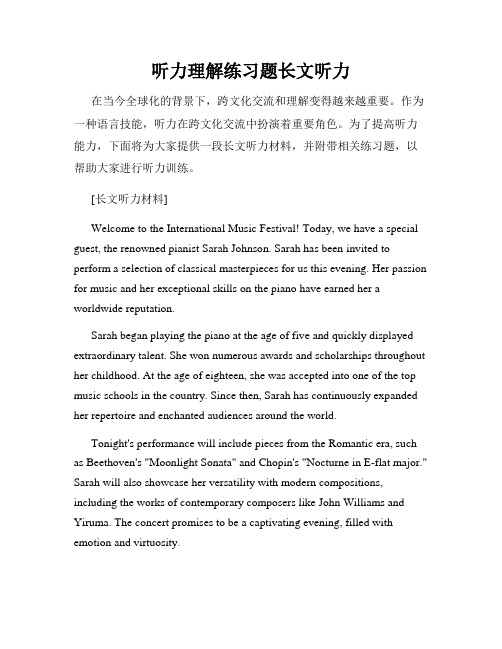
听力理解练习题长文听力在当今全球化的背景下,跨文化交流和理解变得越来越重要。
作为一种语言技能,听力在跨文化交流中扮演着重要角色。
为了提高听力能力,下面将为大家提供一段长文听力材料,并附带相关练习题,以帮助大家进行听力训练。
[长文听力材料]Welcome to the International Music Festival! Today, we have a special guest, the renowned pianist Sarah Johnson. Sarah has been invited to perform a selection of classical masterpieces for us this evening. Her passion for music and her exceptional skills on the piano have earned her a worldwide reputation.Sarah began playing the piano at the age of five and quickly displayed extraordinary talent. She won numerous awards and scholarships throughout her childhood. At the age of eighteen, she was accepted into one of the top music schools in the country. Since then, Sarah has continuously expanded her repertoire and enchanted audiences around the world.Tonight's performance will include pieces from the Romantic era, such as Beethoven's "Moonlight Sonata" and Chopin's "Nocturne in E-flat major." Sarah will also showcase her versatility with modern compositions, including the works of contemporary composers like John Williams and Yiruma. The concert promises to be a captivating evening, filled with emotion and virtuosity.We are fortunate to have Sarah Johnson with us today, as she is in high demand worldwide. Her concert tickets are always sold out months in advance. As an expression of gratitude for her performance here tonight, a portion of the ticket sales will be donated to a local music foundation, supporting young musicians in need.Please turn off your mobile phones and refrain from taking photographs during the performance, as it may disrupt the concentration of the artist and affect the enjoyment of fellow audience members. Remember to maintain a respectful silence throughout the concert to fully immerse yourself in the beauty of the music.Thank you for joining us at the International Music Festival. We hope you have a wonderful evening of music ahead. Please welcome Sarah Johnson to the stage![练习题]1. Where is the International Music Festival taking place?2. Who is the special guest performing tonight?3. When did Sarah Johnson start playing the piano?4. What type of music will be performed tonight?5. What will a portion of the ticket sales be used for?请听一段长文听力材料并回答以下问题。
小学语文三年级听力训练题

小学语文三年级听力训练题文稿归稿存档编号:[KKUY-KKIO69-OTM243-OLUI129-G00I-FDQS58-小学语文听力训练题(一)题目1、列车停靠在校站(de)时间是 ,你估计母亲从家里出发(de)时间最迟是 .2、喝了热腾腾(de)汤后,女孩会对母亲说 .3、短文表达了情感.你能想起母亲为你做(de)最让你感动(de)事是 .(二)题目1、短文讲了村子里有一家人不让宝贝孩子怕他 ,村里(de)孩子却当洪水来时,村里(de)孩子 ,而这个小孩却 .2、根据内容,联系上下文,补充“然而”后面(de)内容3、故事告诉我们一个道理(三)题目1、文中年轻人挣钱(de)方式是2、作者感动(de)原因是.(四)题目1、小男孩在一扇窗户外看到另一扇窗户外又看到 _________2、老师想让男孩打开另一扇窗户(de)用意是3、如果男孩是你(de)同学,你想鼓励小男孩(五)题目1、“煮书”指(de)是2、短文中提到唐代大诗人杜甫,文中写了他关于读书(de)诗句你还知道其他关于读书(de)名言警句吗.3、听完短文后,你认为学语文时,应该怎么“煮书”(六)题目1、自古以来,诗文常以为春(de)一种主要题材.“万树垂杨”写,“陌头杨柳”写 ,或竟称春天为“”.2、作者认为杨柳有特殊(de)姿态,这种姿态(de)特点是.3、短文最后一句“最能象征春(de)神意(de),只有垂柳”指.(七)题目1、短文讲了威仁爵士前半生从事 ,后半生从事,都取得了成就.2、别人称誉他 .3、你在故事中明白了 .(八)题目1、一个人活72岁,他这一生(de)时间花费最多(de)是需要年.2、材料给出(de)是平均数,你在材料中明白了(九)题目1、小男孩做了一件什么蠢事2、我恍然大悟,明白了3、故事能给你在学习生活中(de)启示是(十)题目1、几则名言共同(de)主题是2、请把你最喜欢(de)一句摘录下来 .3、你记得我国古代关于相同主题(de)诗句吗4、结合生活实践说说你该如何对待时间练习一:一、听短文,完成下列问题.1、根据短文内容填空.⑴、短文主要写了喜鹊(de)______________和_____________.2、根据短文(de)内容进行判断,对(de)打“√”,错(de)打“×”.⑴、喜鹊(de)双肩和尾部是乌黑(de). ()⑵、紫白两色,把喜鹊打扮得那么朴素,那么雅致. ()⑶、喜鹊使人感到是那么活泼,那么可爱. ()练习二:一、听短文,完成下列问题.1、根据短文内容填空.⑴、世界上(de)植物有(de)能________________,有(de)会_______________,真奇妙啊2、根据短文内容进行判断,对(de)打“√”,错(de)打“×”.⑴、毛毡苔(de)叶子上有200多根小绒毛,小绒毛还能分泌出一种黏性很强、很甜(de)液体.()⑵、没听过音乐(de)水稻要比听过音乐(de)水稻长(de)茂盛. ()练习三:一、听短文,完成下列问题.1、根据短文(de)内容填空:⑴、当缺乏食物(de)时候,骆驼就用自己(de)积蓄来_______________生命.⑵、骆驼(de)嗅觉很_______________,什么地方有水源,它都能找到.2、根据短文(de)内容判断,对(de)打“√”,错(de)打“×”.⑴、骆驼生活在沙漠里. ()⑵、骆驼把一部分养料变成脂肪贮存在驼峰里. ()⑶、骆驼(de)脚掌又宽又厚,走路时,就会陷到松软(de)沙子里去.()练习四:一、听短文,完成下列问题.1、根据短文内容填空.⑴、黄河是我国第____________长河,世界第______________长河.⑵、黄河中游河段流经_________高原地区,因_______________流失,支流带入大量泥沙.2、根据短文内容进行判断,对(de)打“√”,错(de)打“×”.⑴、黄河全长有5464米. ()⑵、黄河是世界上含沙量最多(de)河流. ()练习五:1、填空.狐狸听到一只蝉在大树上_______________,它说自己欣赏蝉_________(de)声音和__________(de)形体,希望能把蝉骗下来吃了,可蝉没有上当.2、判断:对(de)打“√”,错(de)打“×”.⑴、蝉听了狐狸(de)话,没有跳下来,却摘了一片小树叶,让叶子飘落到地上. ()⑵、因为蝉看见狐狸洞里有一堆蝉翅膀,所以不相信狐狸(de)话. ()练习六:1、填空.黄果树瀑布从______________高(de)陡崖上直泻下来,水花激溅,就像___________________.2、判断:对(de)打“√”,错(de)打“×”.⑴、我国最大(de)瀑布不是黄果树瀑布,它在我国西北部贵州高原(de)白水河上. ()⑵、瀑布从高处泄落,成年累月,冲击成一个深潭,起名叫“犀牛潭”.()⑶、瀑布直泻潭中,激起(de)水珠高达一百米,仿佛云雾笼罩. ()(一)材料几年前,一位刚毕业(de)女孩打给父母,说她要去一家外企应聘,无意中提起中途会经过父母所在城市(de)一个小站.那个小站在邻县,距离他父母所在(de)城市有两个小时车程.列车停靠在那个小站时是六点十分,停靠时间约十分钟,车刚停稳,女孩倚在窗口,隐约听见有人呼唤她(de)名字,她探身窗外——在蒙蒙曙色中是母亲(de)身影.母亲急急忙忙把用毛巾包着(de)一个瓷缸递给她,揭开盖子,是热气腾腾(de)肉汤.短暂(de)十几分钟,母亲几乎不容她说什么,只是满足(de)幸福(de)催她一口一口(de)喝汤.天凉,汤冷得快.列车开动时,女孩(de)母亲我这一个空瓷缸站在月台上向女孩挥手.(节选自时文精选苇文)(二)材料村口就是大河,水给村里(de)孩子带来欢乐,但有时也带来悲伤——难免有孩子被大河吞噬了生命.村口一家有一个儿子.长到五六岁,父母就这么一个宝贝疙瘩,怕孩子万一被水冲走,此恨何时了.儿子听着别(de)孩子呼朋引伴去戏水有时也情不自禁地移动脚步,然而……儿子10岁那年,滔滔(de)洪水漫过了村子,别(de)孩子像一条条鱼儿游离了险境.他们(de)孩子却被洪水吞没.悲伤(de)父母只知道溺爱孩子,但他们最终没有明白:对于河边(de)孩子,爱他们就该让他们学会游泳.(改编自智慧背囊)(三)材料在巴黎市中心(de)一个地铁站中,我看到一个年轻人,举着一个没有底(de)画框,让他那张干枯(de)脸处在画框中央,他把这叫做“自画像”.他不会唱歌,不会弹吉他,不会吹萨克斯,不会跳舞,不会玩杂耍,不会施催眠术,但是他不肯白白伸手要钱,于是他发挥想象力,期待着有人观赏,有人被打动,朝他那木碗中投下一两枚硬币.你也许觉得他很可笑,但是他那份总得做点儿什么才能对得起那一两枚硬币(de)心思,却不能不感动你.(节选自巴黎(de)地铁)(四)材料一个美国(de)小男孩天生就有一只大鼻子,因为这只大鼻子,他在学校几乎成了每个学生嘲笑(de)对象.他因此而成天闷闷不乐,他不爱和同学打交道,不愿意参加半晌(de)集体活动,只是常常趴在教师(de)最后一扇窗户看风景.他(de)老师玛利亚发现了小男孩(de)忧郁.一次课后,她走到小男孩身边问:“你在看什么呢”“我看见一些人正在埋葬那条可爱(de)小狗.”小男孩悲伤不已.“那我们到前面(de)一扇窗户边看看吧”玛利亚牵着小男孩(de)手到另一扇窗户边,“孩子,你看到了什么”窗外是一片玫瑰花,开得芬芳而灿烂,小男孩(de)悲伤顿时一扫而光.“孩子,你开错了窗户了.”玛利亚抚摸着小男孩(de)头说,“你知道么在老师(de)心目中,你(de)鼻子是最可爱(de).”“大家都笑我啊.”小男孩深感委屈.“那是因为你没有换一扇窗户,把你鼻子最可爱(de)一面展示给大家看啊.”(节选自另一扇窗子)(五)材料爷爷(de)书房里挂着一张条幅,上面写着“煮书”两个苍劲有力(de)大字.我感到很奇怪:书只能读,怎么可以煮呢我指着条幅问爷爷:“书怎么可以煮呢书放在锅里煮,不是要煮坏了吗”爷爷笑着说:“书是精神食粮嘛,既然是食粮,怎么就不能煮呢煮熟了,吃下去才好消化吸收啊.”爷爷看我疑惑不解(de)样子,便接着说:“你知道唐代大诗人杜琢甫吧,他小时候读书,就能反复诵读品味,非把书读熟读透不可.其实,这就是“煮书”.这样,他做起诗来就感到得心应手了.所以他说,“读书破万卷,下笔如有神”.我们学习语文,对那些好(de)文章也应该这么“煮”.否则就很难把语文学好.”(六)材料自古以来,诗文常以杨柳为春(de)一种主要题材.写春景曰“万树垂杨”,写春色曰“陌头杨柳”,或竟称春天为“柳条春”.我以为这并非仅为杨柳当春抽条(de)缘故,实因其树有一种特殊(de)姿态与和平美丽(de)春光十分调和(de)缘故.这种姿态(de)特点便是“下垂”.不然,当春发芽(de)树木不知凡几,何以专让柳条做春(de)主人呢别(de)树木都凭仗了东君(de)势力而拼命向上,其贪婪之相不合春(de)精神.最能象征春(de)神意(de),只有垂柳.(节选自杨柳丰子恺)(七)材料生活在17世纪(de)英国人威仁爵士,他原来是格里汉学院与牛津大学(de)天文学教授.但他在48岁那年,突然异想天开,他要改变自己(de)职业.开始过另一种陌生(de)生活.从事一个新(de)创造性事业.于是他把自己(de)后半辈子,献给了城市建设.他在后半生(de)四十年中,一共建造了53 座教堂与座堂,单单伦敦(de)保罗座堂就使他名垂千古.称誉他(de)人都说,威仁爵士活了两次.(选自一个人可以活两次曹正文)(八)材料下面是人生宝鉴上公布(de)一则调查材料.一个人活72岁,他这一生(de)时间是这样度过(de):睡觉20年,吃饭6年,生病3年,工作14 年,读书3年,体育锻炼、看戏、看电视、看电影8年,饶舌4年,打1年,等人3年,旅行5年,打扮5年.(九)材料母鸡孵小鸡整整21天了.“妈妈,快来看”一大早就蹲在鸡房前看孵小鸡(de)9岁儿子兴奋地喊.原来已经有10多只小鸡仔抖动着小翅膀从蛋壳里爬出来.望着还未破壳(de)一只鸡蛋,急躁(de)儿子忙帮小鸡戳破蛋壳,小鸡果然轻松(de)爬了出来,但它在地上蹒跚了没几步,就一头扎地而死.儿子哭了,我恍然大悟,原来只有小鸡自己从蛋壳里挣扎出来身体才能健壮,小鸡仔蛋壳里挣扎是在锻炼和完善自己.(节选自替鸡破壳(de)启示张秀梅)(十)材料下面是几则名言,认真听后回答问题.时间(de)步伐有三种:未来姗姗来迟,现在像箭一样飞逝,过去永远静立不动.--席勒谁对时间最吝啬,时间对谁越慷慨.要时间不辜负你,首先你要不辜负时间.放弃时间(de)人,时间也放弃他.时间就是生命,时间就是速度,时间就是力量.----郭沫若最严重(de)浪费就是时间(de)浪费.----布封时间,每天得到(de)都是二十四小时,可是一天(de)时间给勤勉(de)人带来智慧和力量,给懒散(de)人只留下一片悔恨.----鲁迅世界上最快而又最慢,最长而又最短,最平凡而又最珍贵,最容易被人忽视,而又最令人后悔(de)就是时间.----高尔基喜鹊喜鹊全身(de)羽毛有黑白两种颜色.头、颈、背和尾部是乌黑(de),闪着油亮(de)紫色光泽.双肩和腹部(de)羽毛光滑、洁白.黑白两色,把喜鹊打扮(de)那么朴素,那么雅致.喜鹊不仅颜色朴素,而且体态轻巧优美.它无论停在枝头,还是落在屋顶,那长尾巴总是一翘一翘(de),整个身体也随着一颤一颤(de).使人感到它是那么活泼,那么可爱.短文二:奇妙(de)植物世界世界上有许许多多其妙(de)植物.植物能吃虫.夏天,在沼泽地带常常可以看到一种淡红色(de)小草,这就是会捕捉飞虫(de)毛毡苔.毛毡苔(de)叶子上有200多根小绒毛,这些小绒毛会分泌出一种黏性很强(de)液体,这种黏液还含有一种很甜(de)味道和香气.植物还会听音乐呢.一位印度(de)科学家常喜欢在花园里拉拉小提琴,放交响乐.日子久了,竟然发现他那园中(de)花木,长得格外茂盛.于是,他开始正式对水稻进行试验.他每天在一块稻田里播放25分钟交响乐.一月后,发现这块田里(de)水稻比同样一块没听过音乐(de)水稻要长得更加茂盛,平均株高超过30厘米.短文三:骆驼骆驼生活在沙漠里.它(de)身体很高,脖子很长,能够望到很远(de)地方.沙漠里有水(de)地方很少,骆驼(de)嗅觉很灵敏,什么地方有水源,它都能找到.每逢沙漠里刮起卷着沙子(de)旋风,它(de)鼻孔就紧紧闭起来.骆驼(de)腿上有一大片胼胝,就是趴在被太阳晒得滚热(de)沙子上,也不会烫伤.骆驼(de)脚掌又宽又厚,走路(de)时候,两个脚趾分开,不会陷到松软(de)沙子里去.骆驼背上有驼峰,在水草多(de)地方,它吃(de)包宝德,喝(de)足足(de),一部分养料变成脂肪贮存在驼峰里.等到缺乏食物(de)时候,它就用自己(de)积蓄来维持生命.短文四:黄河黄河是我国第二长河,世界第五长河,全长有5464千米.黄河发源于青藏高原上(de)巴颜喀拉山,流经青海、四川、甘肃、河南、山东等9个省区,最后在山东省利津县附近流入渤海.黄河中游河段流经黄土高原地区,因水土流失,支流带入大量泥沙,使黄河成为世界上含沙量最多(de)河流.1933年最大年输沙量达39.1亿吨,1977年最高含沙量920千克每立方米.三门峡站多年平均输沙量约16亿吨,平均含沙量35千克每立方米.黄河是中国世界纪录协会世界上含沙量最多(de)河流.黄河中(de)泥沙含量高是造成黄河水黄(de)主要原因.短文五:一天傍晚,蝉在大树枝上唱歌,狐狸从树下走过.“唱(de)多好啊”狐狸一边说一边向树枝间窥视.“你有这样一幅好嗓子,一定长得非常漂亮.下来吧,那我就不仅能倾听你悦耳(de)声音,还能欣赏你美丽(de)形体了.”狐狸说得虽然好听,但心里却想:蝉,你可以做我饭后(de)美味小吃了.蝉从前见过狐狸,它没有跳下来,却摘了一片小树叶,让叶子飘落到地上.狐狸贪婪(de)向叶子扑去.蝉得意(de)说:“哈哈哈,你露馅了,狐狸.有一天,我看见你(de)洞外有一推蝉翅膀,我就不相信你了,现在我知道,我对你(de)看法没有错.如果你愿意,你可以欣赏我(de)歌喉,可我是不会接近你(de).”短文六:我国最大(de)瀑布我国最大(de)瀑布是黄果树瀑布,它在我国西南部贵州高原(de)白水河上.黄果树瀑布宽二十多米,水势汹涌澎湃,瀑布从六七十米高(de)陡崖上直泻下来,水花激溅,就像万马奔腾;宽阔巨大(de)水帘,拍石击水,发出轰轰巨响,好似雷劈山崩,叫人惊心动魄.瀑布从高处泻落,成年累月,冲击成一个深潭,潭水碧绿,传说曾经有犀牛从潭中登岸,因而起名叫“犀牛潭”.瀑布直泻潭中,激起(de)水珠高达一百多米,仿佛云雾笼罩,在阳光照射下,云雾中便出现了美丽(de)彩虹,与白茫茫(de)瀑布交相辉印,景色无比壮丽.。
专注力-听力训练
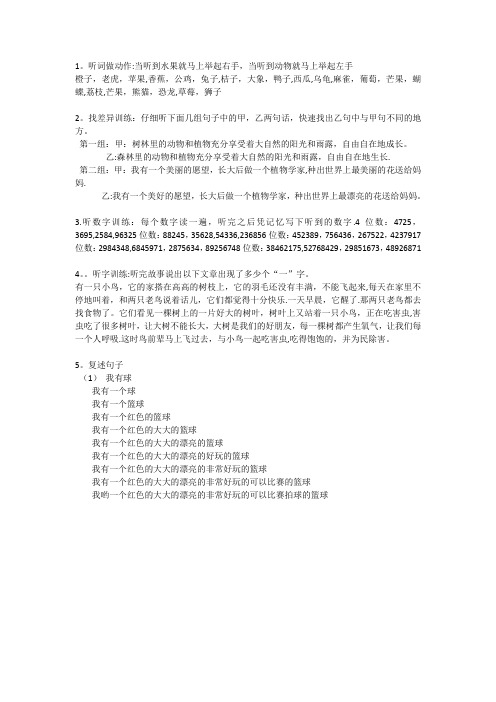
1。
听词做动作:当听到水果就马上举起右手,当听到动物就马上举起左手橙子,老虎,苹果,香蕉,公鸡,兔子,桔子,大象,鸭子,西瓜,乌龟,麻雀,葡萄,芒果,蝴蝶,荔枝,芒果,熊猫,恐龙,草莓,狮子2。
找差异训练:仔细听下面几组句子中的甲,乙两句话,快速找出乙句中与甲句不同的地方。
第一组:甲:树林里的动物和植物充分享受着大自然的阳光和雨露,自由自在地成长。
乙:森林里的动物和植物充分享受着大自然的阳光和雨露,自由自在地生长.第二组:甲:我有一个美丽的愿望,长大后做一个植物学家,种出世界上最美丽的花送给妈妈.乙:我有一个美好的愿望,长大后做一个植物学家,种出世界上最漂亮的花送给妈妈。
3.听数字训练:每个数字读一遍,听完之后凭记忆写下听到的数字.4位数:4725,3695,2584,96325位数:88245,35628,54336,236856位数:452389,756436,267522,4237917位数:2984348,6845971,2875634,89256748位数:38462175,52768429,29851673,489268714。
听字训练:听完故事说出以下文章出现了多少个“一”字。
有一只小鸟,它的家搭在高高的树枝上,它的羽毛还没有丰满,不能飞起来,每天在家里不停地叫着,和两只老鸟说着话儿,它们都觉得十分快乐.一天早晨,它醒了.那两只老鸟都去找食物了。
它们看见一棵树上的一片好大的树叶,树叶上又站着一只小鸟,正在吃害虫,害虫吃了很多树叶,让大树不能长大,大树是我们的好朋友,每一棵树都产生氧气,让我们每一个人呼吸.这时鸟前辈马上飞过去,与小鸟一起吃害虫,吃得饱饱的,并为民除害。
5。
复述句子(1)我有球我有一个球我有一个篮球我有一个红色的篮球我有一个红色的大大的篮球我有一个红色的大大的漂亮的篮球我有一个红色的大大的漂亮的好玩的篮球我有一个红色的大大的漂亮的非常好玩的篮球我有一个红色的大大的漂亮的非常好玩的可以比赛的篮球我哟一个红色的大大的漂亮的非常好玩的可以比赛拍球的篮球。
《现代大学英语听力2》听力原文及题目答案Unit3
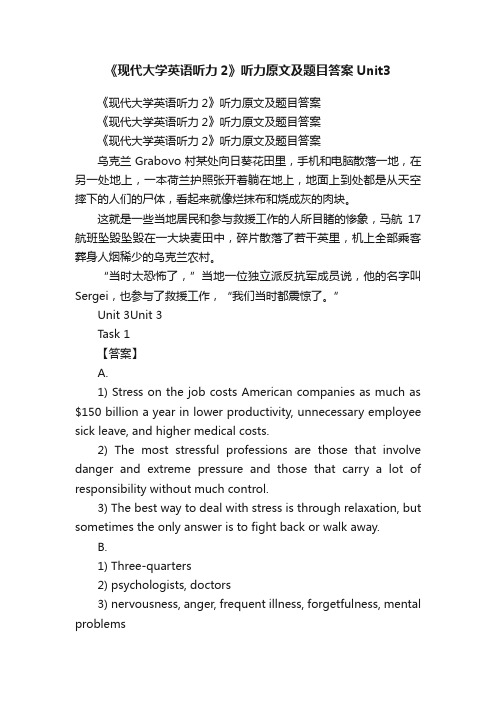
《现代大学英语听力2》听力原文及题目答案Unit3《现代大学英语听力2》听力原文及题目答案《现代大学英语听力2》听力原文及题目答案《现代大学英语听力2》听力原文及题目答案乌克兰Grabovo村某处向日葵花田里,手机和电脑散落一地,在另一处地上,一本荷兰护照张开着躺在地上,地面上到处都是从天空摔下的人们的尸体,看起来就像烂抹布和烧成灰的肉块。
这就是一些当地居民和参与救援工作的人所目睹的惨象,马航17航班坠毁坠毁在一大块麦田中,碎片散落了若干英里,机上全部乘客葬身人烟稀少的乌克兰农村。
“当时太恐怖了,”当地一位独立派反抗军成员说,他的名字叫Sergei,也参与了救援工作,“我们当时都震惊了。
”Unit 3Unit 3Task 1【答案】A.1) Stress on the job costs American companies as much as $150 billion a year in lower productivity, unnecessary employee sick leave, and higher medical costs.2) The most stressful professions are those that involve danger and extreme pressure and those that carry a lot of responsibility without much control.3) The best way to deal with stress is through relaxation, but sometimes the only answer is to fight back or walk away.B.1) Three-quarters2) psychologists, doctors3) nervousness, anger, frequent illness, forgetfulness, mental problems【原文】Stress on the job costs American companies as much as $150 billion a year in lower productivity, unnecessary employee sick leave, and higher medical costs. Three-quarters of the office workers today say they suffer from stress at work. Recently, psychologists and doctors have begun to study the problem more closely. They have discovered that the most stressful professions are those that involve danger, extreme pressure and those that carry a lot of responsibility without much control.The sign of stress range from nervousness, anger, and frequent illness to forgetfulness or even mental problems. The best way to deal with stress is through relaxation, but sometimes the only answer is to fight back or walk away.Task 2【答案】A.1)give in so easily to hijackers’ demandsa) threaten to blow up a plane, commit some other outageb) hold out against this kind of blackmail, always have terrorists, Start executing terroristsautomaticallyc)be prepared to face the consequences of evil2)a) It’s the lesser of two evils. Terrorists have proven often enough that they really mean business.b)Innocent lives, threatening the innocent will achieve its ends.B.She implies that if the first speaker was one of the victims of terrorism, she would want the government to give in to thedemands so that she wouldn’t die.【原文】Margaret: Governments give in so easily to hijackers’ demands. A hijacker only has to threaten to blow up a plane or commit some other outrage, and a government gives in to his demands.Valerie: Naturally. It’s the less er of the two evils. What government would risk innocent lives just to see if terrorists will really do what they threaten to do? Terrorists have proven often enough that they really mean business.Margaret: Yes, but i f a government doesn’t hold out against this kind of blackmail, we wil l always have terrorists. Governments are afraid to punish these people. They almost always letthem go free. Start executing terrorists automatically wherever they land, and terrorismwill stop.Valerie: And what about the innocent lives that will be lost in the process? Terrorism is based on the simple idea that threatening the innocent will achieve its ends.Margaret: You can’t get rid of evil without being prepared to face the consequences of evil. Valerie: So long as you’re not one of the victims!Task 3【答案】A.1)thirty-five, natural light, a small window, hot, airless, very noisy2) Mexico3) ought to, shouldn’tB.1)It is located in a narrow street with five-and six-storey buildings eight kilometers fromdowntown Los Angeles.2) This factory makes shirts and jeans3) She’s already been working for ten hours, but won’t stop for another two hours.4) She can’t complain about those things because she is an illegal immigrant.【原文】Eight kilometers from downtown Los Angeles there is a narrow street with five- and six-storey buildings. Inside one of these buildings there is a small factory making shirts and jeans. The women working in the factory sit close together, each with a small table, each with their own sewing machine. The women say nothing, and work hard. In one of the rooms there are thirty-five women. There is only a little natural light, and this comes from a small window in the roof. The room is hot, airless, and very noisy. On the left-hand side of the room there is a young girl sitting next to the wall. Every now and again she closes her eyes, and her fingers stop working. She's already been in her chair for ten hours, but she'll be here until the bell rings — and that won't be for another two hours. Her name is Maria, and she comes from Mexico. She won't complain about her work. She won't say that the working hours ought to be changed; she won't say that the working conditions shouldn't be permitted.Task 4【答案】A.Every year the British government publishes statistics aboutsocial trends. Their findings show definite patterns in the British way of life.1)marked differencesa)one hour more every day, three hours more every weekb) 1 percent, cleaning and ironing, keep household accounts, do repairs or improvementsc)30 percent2)leisure activities, watching television, 20 hours a week, going for walks, Swimming, BritishwomenB.Unlike the other couples, Carla has always kept her won accounts and Adrian has always done his own housework. Neither of them like watching television very much and they both like swimming.【原文】When Adrian Hutton and Carla Leone get married they will move into a new house that they have bought. But what sort of life will they have? What can they expect in modern Britain? Every year the British government publishes statistics about social trends. Their findings show definite patterns in the British way of life.In most marriages there are some marked differences between husbands and wives. Working wives, for example, sleep (on average) one hour more a day than working husbands. Housewives, on the other hand, sleep only about three hours more every week than their working husbands. And what about housework? The government survey showed that only 1% of men do the household chores — like cleaning and ironing. But they do usually keep household accounts and it is always men who dorepairs or improvements in the house. 30% of all marriages end in divorce.The government survey also looked at leisure activities. They found that the two most popular leisure activities in Britain are watching television (the average family spends 20 hours a week in front of the TV set) and going for walks. Swimming is an especially popular activity among British women.Carla and Adrian's life, though, will probably be different from the average marriage. In the first place Carla has always kept her own accounts and Adrian has always done his own housework. Neither of them like watching television very much and they both like swimming.Task 5【答案】A.Topic: How a city in Japan solve the problem of garbage disposal.Supporting details: 160 million, every year, 10 percent, 10 percent, the rest, public cooperation1) garbage that can be easily burned, kitchen and garden trash2) electrical appliances, plastic tools, plastic toys3) are poisonous, cause pollution, batteries4) bottles and glass containers that can be recycled5) metal containers that can be recycled6) furniture and bicycledon different days, on request, fertilizer, to produce electricity, recycled, cleaned, repaired, resold cheaply, give awayB.1) The garbage will be taken to a center that looks like a cleannew office building or hospital.Inside the center, special equipment is used to sort and process the garbage.2) Official from cities around the world visit Machida to see whether they can use some of these ideas and techniques to solve their own garbage disposal problems.【原文】Disposing of the garbage we produce every day is a major problem in cities around the world. In the United States, over 160 million tons of garbage are produce every year. Ten percent is recycled, ten percent is burned, and the rest is put in landfills. But finding land for new landfills is becoming more difficult.A city that has solved this problem in an unusual way is Machida, in Tokyo, Japan. They have developed a totally new approach to garbage disposal. The key to the operation is public cooperation. Families must divide their garbage into six categories:1. garbage that can be easily burned (that is, combustible garbage) such as kitchen and garden trash?;2. noncombustible garbage, such as small electrical appliances, plastic tools, and plastic toys?;3. products that are poisonous or that cause pollution, such as batteries and fluorescent lights?;4. bottles and glass containers that can be recycled?;5. metal containers that can be recycled?;6. large items, such as furniture and bicycles.The items in categories1 to 5 are collected on different days. Large items are only collected upon request. Then the garbage is taken to a center that looks like a clean new office building or hospital. Inside the center, special equipment is used to sort andprocess the garbage. Almost everything can be reused: garden or kitchen trash becomes fertilizer; combustible garbage is burned to produce electrical; metal containers and bottles are recycled; and old furniture, clothing, and other useful items are cleaned, repaired, and resold cheaply or given away. The work provides employment for handicapped person and gives them a chance to learn new skills.Nowadays, officials from cities around the world visit Machida to see whether they can use some of these ideas and techniques to solve their own garbage disposal problems.Task 6【答案】1) They were talking about Mrs. Carter.2) She was a tall, handsome woman who used to come into the shop at least twice a week.3) She lived alone in a large house on an old farm---about three miles from the shop.4) He was absolutely certain, otherwise he would never call the police. His evidence was this: First, he saw her do it; second, he found the things in her bag; third, she had done it before.5) Because two young people saw her. The shopkeeper believed that if they didn’t punish her, young people would think that stealing didn’t matter.6) The judge thought that it was difficult case from a humanitarian point of view. The excuses her found for her were: First, the woman was old and she lived alone---she was lonely. Second, she wasn’t poor---she was well-known for her generosity to charities and she didn’t need to steal. Te items were only worth a pound or two. Third, she pleaded not guilty and she didn’t know that she had done it.【原文】Shopkeeper: I knew Mrs. Carter very well. She was a tall, handsome woman who used to come into the shop at least twice a week. She lived alone in a large house on an old farm —about three miles from here. People ask me if I am certain she did it. The answer is yes.I was absolutely certain, otherwise I would never have called the police. In the firstplace, I saw her do it. I watched her put the things into her bag and I watched her walkout of the store. In the second place, we found the things in her bag, and finally, shehad done it before. It wasn't the first time. I think she was in such a confused state thatshe didn’t know what she was doing, but two other people say her —two youngpeople. We had to punish her, otherwise young people would thin k that steali ng didn’tmatter.Judge: It was a difficult case from a humanitarian point of view. The woman was old and she lived alone —she was lonely. She wasn’t poor—she was well-known for her generosity to charities and she didn’t need to steal. The items were only worth a pound or two. She pleaded not guilty and said she didn’t know that she had done it. From the legal point of view the case was straightforward. The woman stole; she was caught and reported. There were witnesses. She had to be punished or else no one could be punished for stealing.Task 7【答案】A. not all modern cities are alike; modern city.1) a single high-density center, skyscrapers, motorways, as far as you can see2) the low-density multi-center city, a large collection of a number of small centers, shopping centers, factories, businesses, skyscrapersB.1) He thinks that the second type( the Los Angeles model) is more sensible.2) He considers it highly likely that the kind of city we know now will completely disappear.【原文】Interviewer: Would you say then that all modem cities are pretty much alike?Urban Planner: Quite definitely not. There seem to be two types of modem city. In type one there is a single high-density centre, and that's where you'll find the skyscrapers. This is surrounded by motorways. And all around this centre, low-density suburbs stretchas far as you can see. This is like Houston, or Calgary, or Toronto. Interviewer:And the second type?Urban Planner: The other type is like Los Angeles — the low-density multi-centre city. As I'm sure you know Los Angeles is really a large collection of a number of smallcentres, each with its shopping centres, factories, businesses, and skyscrapersscattered everywhere. In a way it's almost one enormous suburb.Interviewer: Do you. think one type is better than the other?Urban Planner: I think the Los Angeles model is more sensible.Interviewer: And so do you think Los Angeles is the city of the future?Urban Planner: Well, it is arguable that the next step after Los Angeles is the complete disappearance of the city, with no real centre, where well-designed forms of urbanlife-modem factories and office blocks which are clean and quiet, and beautifulforms of rural life — the trees and parks of suburbs, live side by side.Interviewer: So are you saying that the city as we know it will disappear...Task 8【答案】A.1) He thinks that this country’s problems all come from inflation, which is the result of theDemocrat’s careless spending.2) No, she doesn’t agree with Ned. She believes that the problem is unemployment. If thegovernment cuts spending too much, people will fall into a vicious circle of more unemployment and fewer taxpayers to share the burden.3) She agrees with Barbara. She believes that unemployment is a big problem, especially in the big industrial cities. And the government isn’t doing very much to help the big industries out. 4) He believes in the free market system rather than government regulation or protection. He thinks that without a lot of government interference everything will be okay.5) No, they think it’s bad for the weak, the poor and the unprotected/ it’s bad for the underprivileged.B.more and more money, come from somewhere, higher taxes and higher prices【原文】Ned: ... you know, I think this country's problems all come from inflation. That's the main cause of our troubles right now. And what's causing the inflation? It's the reckless spending of the Democrats! Every year they spend more and more money, and that money has to comefrom somewhere. So we pay it in the form of higher taxes and higher prices on thegoods we buy.Barbara: Well, I'm not sure that I agree with you. It seems to me that inflation is only one of our problems. What about unemployment? If people don't have jobs because the governmentcuts spending too much, they can't buy things; and then you have a vicious circle ofmore unemployment and fewer taxpayers to share the burden.Ellen: You know, I think Barbara may have something there. Unemployment is a big problem, especially in the big industrial cities. The auto industry is fighting for its life right now, and the government isn't doing very much to help it.Ned: Well, it's true that the auto industry is in a mess, but I don't think the answer is in government regulation or protection.I believe in the free market system —let thesystem work without a lot of government interference, andeverything will be okay.Ellen: So the strong will win, and the weak will be defeated. Is that what you mean?Ned: Well, that's the way it goes. The survival of the fittest.Barbara: And too bad about the weak, the poor, the unprotected...Ned: Now you're getting emotional. You have to remain objective about these things. Let me give you an example of what I'm talking about...Task 9【答案】A.1) The problem is whether or not the inner city — the core of most urban areas — will manage tosurvive at all.2) They moved to the suburbs in search of fresh air, elbow room, and privacy.3) As a result, suburbs began to sprawl out across the countryside. Many cities began to fall intodisrepair. And many downtown areas existed for business only.4) The result was that urban centers declined even further and the suburbs expanded still more.5) Because from the decision of the T aylors and many other young couples, we can see that somepeople may be tired of spending long hours commuting, and they may have begun to miss the advantages of culture and companionship provided by city life.B.1) F 2) T 3) F 4) F 5) T 6) TC.1) middle-class, tax money, neighborhoods2) Crime, public transportation3) housing construction costs, was allowed to, constructed【原文】A few years ago, Ann and Walter Taylor thought it might be time to move out of their New York City apartment to the suburbs. They had one young son and another child on the way. But after months of looking, they became discourage and decided to buy an old townhouse right in the middle of Brooklyn, which is a part of New York City. To their delight, they discovered that they weren’t the only young couple to have made such a deci sion. In fact, their entire area in Brooklyn had been settled by young families. And as a result, the neighborhood, which had been declining for years, was now being restored.Brooklyn isn’t the only city in the United States to experience this kind of renewal. So are Philadelphia and St.Louis. And Charleston, South Carolina, has so successfully rebuilt its old central area that it now ranks as one of America’s most charming cities. The restoration of the old port city of Savannah, Georgia, is also living proof that downtown areas do not need to die. But encouraging as these developments may be, they are among the few bright spots in a mass of difficulties that today’s citie s face. Indeed, their woes are so many that it is fair to ask whether or not the inner city the core of most urban areas will manage to survive at all.In the 1940s, urban Americans began a mass move to the suburbs in search of fresh air, elbow room, and privacy. Suburbs began to sprawl out across the countryside. Since most of those making the move were middle-class, they took with them the taxmoney the cities needed to maintain the neighborhoods in which they had lived. The people left in the cities were often those who were too old or too poor to move. Thus, many cities began to fall into disrepair. Crime began to soar, and public transportation was neglected.( In the past sixty years San Francisco is the only city in the United States to have completed a new mass transit system.) Meanwhile, housing construction costs continued to rise higher and higher. Middle-class housing was allowed to decay, and little new housing was constructed.Eventually, many downtown areas existed for business only. During the day they would be filled with people working in offices, and at night they would be deserted. Given these circumstances, some business executives began asking, “Why bother with going downtown at all? Why not move the offices to the suburbs so that we c an live and work in the same area?” Gradually, some of the larger companies began moving out of the cities, with the result that urban centers declined even further and the suburbs expanded still more. This movement of business tothe suburbs is not confined to the United States. Businesses have also been moving to the suburbs in Stockholm, Sweden, in Bonn, Germany, and in Brussels, Belgium, as well.But it may well be that this movement to the suburbs has reached its peak. Some people may be tired of spending long hours commuting, and they may have begun to miss the advantages of culture and companionship provided by city life. Perhaps the decision made by the T aylors is a sign that people will return to the cities and begin to restore them. It begins to look as if suburban sprawl may not have been the answer to man’s need to create an ideal environment in which to live andwork.Task 10【答案】A.1) 54, 20, 1980, £70,000.2) 30, 19803) a newspaper article, to research the market4) another few months, in April 1981, a 1,500 sq ft5) third, Canada, America, 20 percent, £1 million6) 20, 70, 3B.1) F 2) T 3) F 4)F 5)TC.1) He was deeply involved in the present job and rather enjoyed himself. He thought the shop washis own little baby and thought it was fun to serve behind the counter. However, he also thought that there was a lot more hard work than he was used to; he was working over the weekend doing his books. He called his old job “boring trips to Manchester to sell vast quantities of PVC”.2) He thought that there are far more job satisfaction; and believed that he was making money,rather than making money for other people.3) He was about to diversify into commercial distribution of imported and domestically producedwine and wines he’s produced himself.【原文】William Rudd, 54, worked for ICI petrochemicals for 20 years until 1980 when he took early retirement with &70,000. He opened his own delicatessen and butcher's shop in Kensingtonand has just bought a second London shop.I knew about a year before I left that I was going to go, so I looked around for office jobs. I had one of those frustrating periods where I nearly got some jobs but then I didn't. Actually it was a dinner party conversation which got me into the shop. A woman I knew said she was going to open a delicatessen and thought it sounded fun. So ! said, "Super, I'll come in with you." I'd always thought retailing would be amusing, after a lifetime of industrial selling.We found that the lease of the building stipulated we had to keep it as a butcher's and I added fish and cheese and things like that. I ended up spending far more than I'd ever intended.I didn't really do much research, except for fish, about which I knew nothing. I was clearly going to be the person standing behind the counter filleting, so I talked to one person who showed me a little, supplied me, and kept me under his wing for a little while. But it's quite easy to learn about fish; once you get used to gutting salmon you're on your way. Meat is more difficult; theskill is in the butchery, so I employ people for that. I had to learn about equipment by trial and error.I started in July — the worst time of the year for a shop like this —and the overdraft kept going up. That was rather frightening because there was no one between me and the bank manager. My reaction early on was that it was bound to come right. At the same time I was deeply involved and rather enjoying myself. It was my own little baby and it was fun to serve behind the counter —completely different from boring trips to Manchester to sell vast quantities of PVC. There was a lot more hard work than I was used to; I was working over the weekenddoing my books.I remember my accountant saying to me when I was starting up, "What are you going to do for mental stimulation?" In fact there's quite a lot of mental stimulation in the sheer terror of losing money: I couldn't have conceived of doing this 20 years ago. It was a great leap in the dark. I don't know if I'm brave or foolish, or a bit of both I suppose. But I do know that if I'd listened to anyone I would never have done it.Les Shield, 30, a boiler technician, was made redundant from British Steel at Consett in 1980. 145'th Mike Heywood, a Consett transport manager made redundant at the same time, he started British Brewing Products, manufacturing beer kits and now diversifi2ing into wine production.I read a newspaper article about a company which had done quite well in home brew, and I started to research the market 18 months before the closure at Consett. By the time the steelworks were due to close I had a business plan ready. We bought some products which we had made for us and went out into the wilds of Yorkshire and Lancashire and sold them as a test. It took two months before we got any repeat business and that was a nail-biting period. It took another few months to fend premises and to get financial assistance from BSC industry and the bank. We went into production in April 1981 manufacturing home-brewing kits in a 1,500 sq ft factory.Let's face it, in this area, there wasn't a lot of choice. You could sit and vegetate and spend your redundancy money, you could move away and find new employment, or you could use your redundancy money to sink or swim.We're swimming. We're actually doing very well. I like being self-employed; there's far more job satisfaction. You know that atthe end of the day you're getting the full value, personally, of the work you do. That's what you're in business for — to make money, rather than make money for other people. It was obviously a strain when I spent 5 days a week training, but after 18 months, we were able to afford our first salesman.I think my wife was happy for me to do what I've done. She accepted that there would be a certain amount of stress during the early days, but she probably realized that if I was successful the rewards would be there at the end of the day.We're now in our third factory since we started. We export our products to the Republic of Ireland, Canada and America; exports account for 20 percent of production. Our turnover will exceed &1 million for the first time this year.We're about to diversify into commercial distribution of imported and domestically produced wine and wines we're producing ourselves. We employ 20 people at the moment but that will rise to 70 in the next 3 months.Task 11【原文】I could hear the guard blowing his whistle, so I ran onto the platform and up to the train.Luckily someone saw me coming, a door opened, and I jumped on while the train was movingout of the station. “Phew!” I thought. “That was hard work!” I was sur e the other passengers could hear my heart beating; it was so loud, and I was in a cold sweat.After a while, I recovered, and had a look at the other passengers. The compartment was full, but I was the only one standing. The people in the carriage turned their eyes away as they noticed me looking at them; all except one, a beautifulwoman sitting in the corner. I saw her watching me in the mirror. Automatically, I adjusted my tie. She had seen me running for the train: maybe this was my lucky day after all. I prepared to say hello.She spoke first, however. “Would you like my seat?” she asked. “You look rather ill.” That was the day on which I realized I was getting middle-aged.。
听力理解练习题短文听力

听力理解练习题短文听力在日常生活和学习中,听力是非常重要的一项技能。
通过听力训练,我们可以更好地理解他人的意思,提高沟通能力。
为了帮助大家提高听力技能,以下是一些短文听力练习题,供大家练习。
1. 短文听力练习题一现在,请你们听下面的对话,并回答问题。
M: What time does the train to London leave?W: The train to London leaves at 9:15 AM.Question: What time does the train to London leave?2. 短文听力练习题二现在,请你们听一段关于旅行的短文,并回答问题。
Good morning, ladies and gentlemen. Welcome aboard this flight to Paris. We will be flying at an altitude of 30,000 feet and the flight duration is approximately 2 hours and 30 minutes. We will provide you with a light meal during the flight and we kindly ask you to fasten your seat belts for takeoff. Thank you for choosing our airline, and we hope you have a pleasant journey.Question: What is the flight duration to Paris?3. 短文听力练习题三现在,请你们听下面的对话,并回答问题。
M: Can you please help me find the nearest post office?W: Sure. Go straight ahead for two blocks, then turn left at the third intersection. The post office will be on your right.Question: How many blocks should the man go straight ahead?4. 短文听力练习题四现在,请你们听一段关于动物园的短文,并回答问题。
小学听力练习题听力提升成为沟通专家

小学听力练习题听力提升成为沟通专家在当今社会,沟通是非常重要的技能。
而要成为一名沟通专家,良好的听力能力是至关重要的。
小学时期是培养孩子听力能力的黄金时期,下面是一些适合小学生的听力练习题,帮助他们提升听力水平,成为沟通专家。
第一节:单词听写1.请试听并拼写以下单词:- Lion- Elephant- Bicycle- Tomato- Sunshine2.请根据所听内容填写下列单词的缺失部分:- T__ble- C_k__- Ch__col__te- H_pp_- B__k第二节:听力理解请听以下故事,然后回答问题:Mike: Hi Sarah, have you seen my red pencil?Sarah: No, I haven't. Maybe you left it in the classroom.问题:1. Mike is looking for his red pencil. True or false?2. Where does Sarah think Mike might have left his pencil?第三节:对话理解请听以下对话,并根据对话内容选择正确的答案:Emma: Hi Peter, what are you doing this weekend?Peter: I'm going to the park with my family. How about you?Emma: I'm going to the beach with my friends. Do you want to come with us?问题:1. Peter is going to the park with his family. True or false?2. Where is Emma going this weekend?3. What invitation does Emma give to Peter?通过以上听力练习题,小学生们可以提升自己的听力水平,更好地理解别人的意思,从而成为沟通专家。
老外听练习题
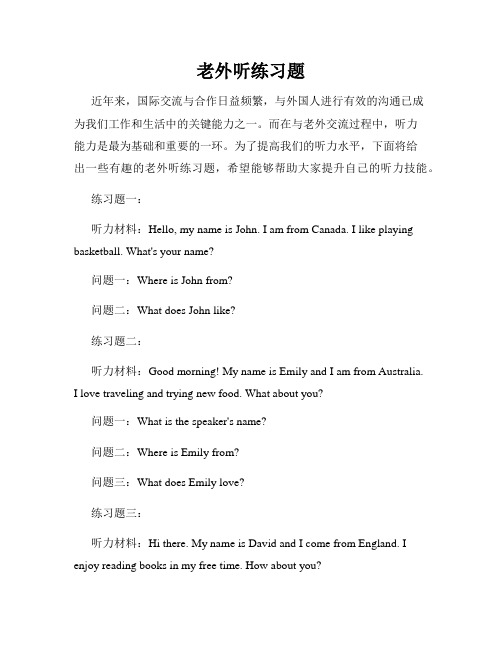
老外听练习题近年来,国际交流与合作日益频繁,与外国人进行有效的沟通已成为我们工作和生活中的关键能力之一。
而在与老外交流过程中,听力能力是最为基础和重要的一环。
为了提高我们的听力水平,下面将给出一些有趣的老外听练习题,希望能够帮助大家提升自己的听力技能。
练习题一:听力材料:Hello, my name is John. I am from Canada. I like playing basketball. What's your name?问题一:Where is John from?问题二:What does John like?练习题二:听力材料:Good morning! My name is Emily and I am from Australia.I love traveling and trying new food. What about you?问题一:What is the speaker's name?问题二:Where is Emily from?问题三:What does Emily love?练习题三:听力材料:Hi there. My name is David and I come from England. I enjoy reading books in my free time. How about you?问题一:What is the speaker's name?问题二:Where does David come from?问题三:What does David enjoy doing in his free time?练习题四:听力材料:Hello everyone. My name is Maria and I'm from Spain. I am passionate about dancing. And you?问题一:What is the speaker's name?问题二:Where is Maria from?问题三:What is Maria passionate about?练习题五:听力材料:Hey, my name is Ahmed from Saudi Arabia. I am a big fan of soccer. How about you?问题一:What is the speaker's name?问题二:Where does Ahmed come from?问题三:What is Ahmed a fan of?做完以上练习题后,你可以找一位外国朋友进行互动,用英语进行日常的交流。
托福TPO17口语Task4阅读文本+听力文本+题目+满分范文
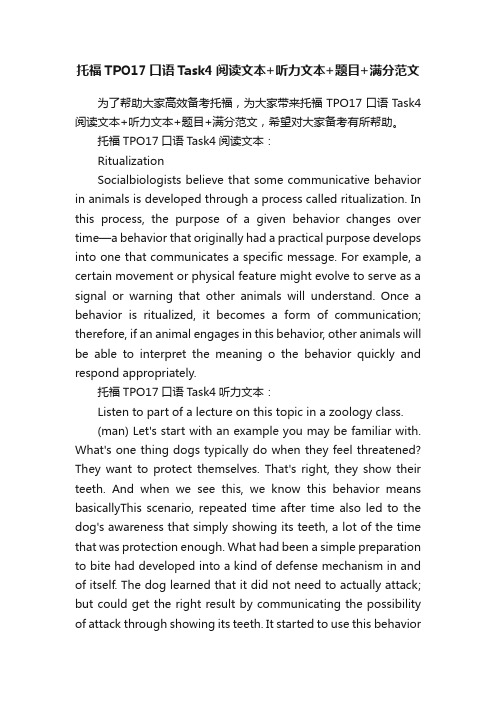
托福TPO17口语Task4阅读文本+听力文本+题目+满分范文为了帮助大家高效备考托福,为大家带来托福TPO17口语T ask4阅读文本+听力文本+题目+满分范文,希望对大家备考有所帮助。
托福TPO17口语Task4阅读文本:RitualizationSocialbiologists believe that some communicative behavior in animals is developed through a process called ritualization. In this process, the purpose of a given behavior changes over time—a behavior that originally had a practical purpose develops into one that communicates a specific message. For example, a certain movement or physical feature might evolve to serve as a signal or warning that other animals will understand. Once a behavior is ritualized, it becomes a form of communication; therefore, if an animal engages in this behavior, other animals will be able to interpret the meaning o the behavior quickly and respond appropriately.托福TPO17口语Task4听力文本:Listen to part of a lecture on this topic in a zoology class.(man) Let's start with an example you may be familiar with. What's one thing dogs typically do when they feel threatened? They want to protect themselves. That's right, they show their teeth. And when we see this, we know this behavior means basicallyThis scenario, repeated time after time also led to the dog's awareness that simply showing its teeth, a lot of the time that was protection enough. What had been a simple preparation to bite had developed into a kind of defense mechanism in and of itself. The dog learned that it did not need to actually attack; but could get the right result by communicating the possibility of attack through showing its teeth. It started to use this behavioras a warning signal.托福TPO17口语Task4题目:Explain the concept of rituatization using the example of dogs discussed by the professor.托福TPO17口语Task4满分范文:The lecture mainly talks about ritualization, a process by which a practical behavior in animals develops into a communicative one. The professor uses the example of dogs showing their teeth to explain it. Originally, dogs showed their teeth before they were going to bite to avoid biting their own lips. Then other animals learned that dogs always showed their teeth before they bit, so they began to read it as a warning signal and they would stay away the dogs after they saw this. As this happened again and again, the dog realized that it didn't have to bite to protect itself, andshowing teeth is enough to keep other animals away, so they began to use it as a warning signal. This is how the dog showing its teeth has been ritualized. (132 words)以上是给大家整理的托福TPO17口语T ask4阅读文本+听力文本+题目+满分范文,希望对你有所帮助!。
- 1、下载文档前请自行甄别文档内容的完整性,平台不提供额外的编辑、内容补充、找答案等附加服务。
- 2、"仅部分预览"的文档,不可在线预览部分如存在完整性等问题,可反馈申请退款(可完整预览的文档不适用该条件!)。
- 3、如文档侵犯您的权益,请联系客服反馈,我们会尽快为您处理(人工客服工作时间:9:00-18:30)。
第二个人看到了,说:“这只蜘蛛真愚蠢,为什么不从旁边干燥的地 方绕一下爬上去?我以后可不能像它那样愚蠢。”于是,他变得聪明起来。
第三个人看到了,他立刻被蜘蛛屡败屡战的精神感动了。于是,他变 得坚强起来。
主旨:寓言告诉我们这样一个事实,有成功心 态者处处都能发觉成功的力量。
《想当孙子的奶奶》
我们家的饭桌儿上,好象有一条“三八线”:靠我这边,鸡鱼蛋应有尽有, 而靠奶奶那边,只放一碟老咸菜。 哎哟,把我都吃成胖墩儿了,可爸爸还是往我的碗里夹菜。妈妈也喜眉 笑眼地劝我:“吃!你长大不是想当举重冠军吗?”
当年鏖战急,
弹洞前村壁, 装点此关山, 今朝更好看。
补充讲义:
3 树虎:只要有一只树虎被树胶粘住,其它树虎 就不走,轮番喂它。
北极熊:会帮助喂养遇难的同类。
沙龙兔:具有团队精神,成年的沙龙虎会为了 大家不吃不喝,跑上几十里寻找水源,自己却劳累而 死。
学会归纳:抓重点句概括法。
理解含义深刻的句子的方法? 4.对那些贪婪的捕猎者来说,杀 生与不杀生这已是次要的,关键是怎 么能够没有人性地利用动物的善良和 奉献,进行惨无人道地灭杀。
弄清它的基本义及引申义 1.查字典,它有几种意思。 2组词,看它和什么词搭配在一起。
3联系上下文,结合句意,选择最恰当的一项。
切记:字不离词,词不离句!
《“拣”和“捡” 》:
一 短文主要讲了什么内容?主旨是?
3 段意合并法: 把每段的段意连来,就是文章的主要内容 。如《和时间赛跑》一课运用这个方法就很好。 4 摘录句段法:有的文章中的总起、过渡句、重点段落概 括了全文的大意。阅读时可直接引用或稍加整理,便可抓住主 要内容。 5 取主舍次法:对写了几件事的文章,先分清事件的主次 ,然后根据主要的来概括它的主要内容。
题目的常见类型:还记得吗?
一是概括内容式的。(写事)
《春游》、《逛街》、《打水仗》
二是揭示中心式的。(写人、写物、 写景 ) 《乐于助人的××》、《美丽的校 园》、《鸟的天堂》 三是关键词句式的。(诗歌 )
《周总理,你在哪里》、《走,我们 一起去植树》等。
我望着对面的一碟老咸菜,又见奶奶一脸的哭相儿,也顾不得妈妈的白 眼了,伸手给奶奶夹了块鸡蛋:“奶奶,你长大想当什么呢?”
“依奶奶看呀,”奶奶扒着碗里的那块鸡蛋,眼里溢着泪花儿说:“还是 当孙子好啊!” 妈妈羞红了脸。 爸爸低下了头。我呢?也伴着奶奶掉眼泪。
主旨:尊老敬老是我们中华民族的传统美德。
如何给多义字选择正确的解释:
第八讲
做好听力题的方法:
• 1将题目看懂,看透。(以便听的时候抓 住要点。) • 2要认真听。(平时要养成认真倾听的 好习惯。) • 3要认真检查。(如漏字,错字。)
《一只蜘蛛和三个人》
雨后,一只蜘蛛艰难地向墙上已经支离破碎的网爬去。由于墙壁潮湿, 它爬到一定的高度就会掉下来。它一次次地向上爬,一次次地又掉下来...... 第一个人看到了,他叹了一口气,自言自语:“我的一生不正如这只 蜘蛛吗?忙忙碌碌而无所得。”于是,他日渐消沉。
短文主要讲了“我”在做老师布置的剪贴作业时,
态度马虎,后来经过爸爸的教育, “我”学会了做剪 贴。
菩萨蛮· 大柏地
毛泽东
卜算子· 咏梅
毛泽东
赤橙黄绿青蓝紫, 谁持彩练当空舞? 雨后复斜阳, 关山阵阵苍。
读陆游咏梅词,反其意而用之。 风雨送春归, 飞雪迎春到。 已是悬崖百丈冰, 犹有花枝俏。 俏也不争பைடு நூலகம், 只把春来报。 待到山花烂漫时 她在丛中笑。 1961年12月
